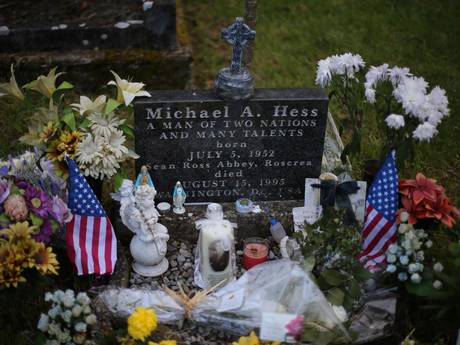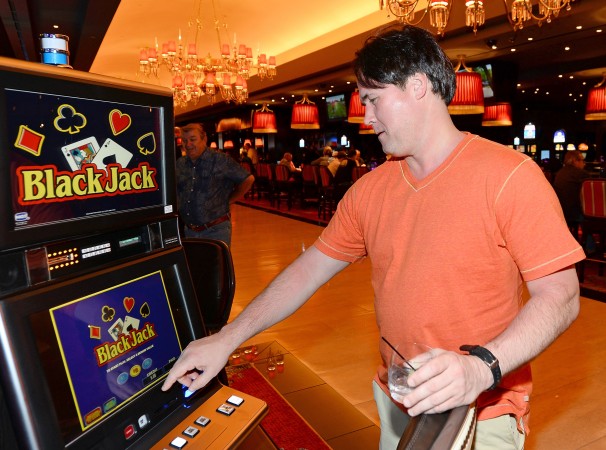
Justice Department, AmeriCorps join to give legal help to children who come to …
June 8, 2014
Ireland mass graves: Unearthing one of the darkest chapters in Irish history
June 8, 2014Since last year, state Sen. Tick Segerblom, a Democrat, has been trying to bring back political betting in Nevada, the gambling capital of the United States. In 2012, U.S. regulators banned Dublin-based predictions exchange Intrade from allowing Americans to bet on elections. The practice continues abroad — Hillary Clinton is currently a ringer for 2016 in U.K.-based offbeat markets, as In the Loop reported — and Segerblom laments that the U.S. is not seeing a penny of the profits.
“The reality is this is already happening offshore,” he said. He’s trying to get gambling allies on his side in 2014 — and his proposal would only allow betting on federal elections in Nevada’s brick and mortar establishments. “2016 is right around the corner,” added Segerblom. “Seems like the right time to do it.”

Pete Speranza of Minnesota plays a video blackjack machine at The Cromwell Las Vegas on May 21 in Las Vegas. (Photo by Ethan Miller/Getty Images)
Segerblom definitely is not the first person to stand up for the merits of political gambling, and U.S. regulators are definitely not the first people to complain about it.
During the 1916 presidential election, $160 million was bet on the race on New York City’s “curb exchange,” the predecessor to the stock exchange. The New York Times described the election betting scene in a 2007 story:
New York was a natural place for such markets because of its proximity to both Wall Street and the headquarters of the two political parties.
“Until the 1920s, New York would have been the center of gambling in the United States, what Las Vegas is today,” said Paul Rhode, a professor of economic history at the University of North Carolina, Chapel Hill. Technically, gambling on the result of an election was — and is — illegal, but the laws were not widely enforced, and newspapers routinely reported the names of prominent bettors and the Wall Street firms that held the stakes.
After hours, curb betting often moved indoors to uptown hotels like the Astor and the Waldorf-Astoria; and reporters followed the money. “$300,000 Wagered in Broadway Hotels and $400,000 in Wall Street on Results,” read the front page of The New York Daily Herald on Election Day 1904.
Nearly half the bettors worked in banking or other white-collar jobs, but less-wealthy bettors were not without options. Because monetary bets often exceeded most annual salaries, many chose to gamble on an election by agreeing to engage in an embarrassing public spectacle if their candidate lost.
These “freak bets” were not just the province of the less well off, as The New York Times reported after the 1904 election: “Brokers, and even bankers, play barrel organs; dignified citizens have their whiskers trimmed in every conceivable fashion but the one they are accustomed to; stout men roll a peanut up a steep hill with a wooden toothpick.”
In 1926, David Barnett, a political leader in the Bronx, started a campaign against political gambling, arguing that the exchange of money was having a direct impact on the outcome of races. Frank Silinksy, a lawyer and political gambling enthusiast, disputed Barnett’s worries.
“In big elections, such as those for Governor or for President, I do not believe that the making of bets or the printing of the news about them has any effect at all on the results, nor that voters are influenced by them in any way. In a small local election, as in a district, the circulation of a story that such and such an amount has been bet on a candidate might have some effect, but I don’t think it makes any great difference in a big contest.”
Silinsky’s views mirror Segerblom’s almost exactly. During hearings concerning his legislation in the state senate, he often gets asked whether political betting could throw elections. He points abroad as an answer. “This is already taking place. It’s nothing new.” He also says that if one person dumped a bunch of money behind a candidate, it would look fishy, not prescient. With local races, he concedes that the dangers of influencing elections would be larger, but he would “absolutely” want to think about expanding gambling to local races in Nevada if his current quest proves successful.
Before the omnipresence of public polling, political gambling and the near constant press it received were often the best resources campaigns and voters had to test electoral fortunes before ballots were cast. In 1944, Arthur Krock referenced the “gamblers’ poll,” which tracked bets in the “key states of New York, Pennsylvania, Missouri, Massachusetts and Michigan.” Reporters would hound stakeholders to find out who placed the largest bets, much like reporters today try to find out who the biggest donors to 501(c)4s might be. One stakeholder told a reporter in 1884 that he could not divulge the names of the biggest betters because of an awful sore throat.
Thinkpieces were written about why people love to bet on elections. In 1915, The Washington Post published a piece that began, “Why do men bet?” The answer apparently, was that “men gamble because it enables nerves to blow off steam.” Besides betting on elections, New York stakeholders managed bets on the opening date of the Erie Canal, the length of the Manhattan Bridge or the newest play, or the price of coal six months in the future.
Even after the ascendancy of polling, elections markets have been considered excellent political campaign weathervanes. Soon after Intrade’s exit from the United States, Brad Plumer wrote on Wonkblog, “I’ll confess, I spent a good chunk of the 2012 campaign clicking on Intrade.com several times a day to see where the House, Senate and presidential races stood. All those traders betting on the eventual outcome, I figured, could provide a more accurate synopsis of the race than reading endless blog posts and tweets.”
After the 2008 presidential, David Rothschild at the Wharton School of the University of Pennsylvania found that InTrade could sometimes prove more accurate at predicting elections than FiveThirtyEight, Nate Silver’s vaunted polling aggregation site, especially in uncertain races — the ones that everyone is most eager to hear predictions about. There is even a guide that explains how policy wonks can use political gambling for their own nefarious quantitative uses.
In more recent elections, political gambling has continued, despite becoming more of a novelty than a feature of election reporting. In 1994, one bookmaker had Hillary Clinton at 50 to 1 for the 1996 presidential election — she’s at 6 to 4 for 2016. Intrade says that $230 million was bet during the 2012 presidential campaign.
Segerblom is trying to bring this money and time-worn American tradition back to Nevada, and the state’s legislative committee on technology and gaming will look at his bill on Tuesday. We tried to see if the U.K. bookmakers still trading in American electoral predictions would offer some odds on the bill’s chances of success, but they have not responded.




